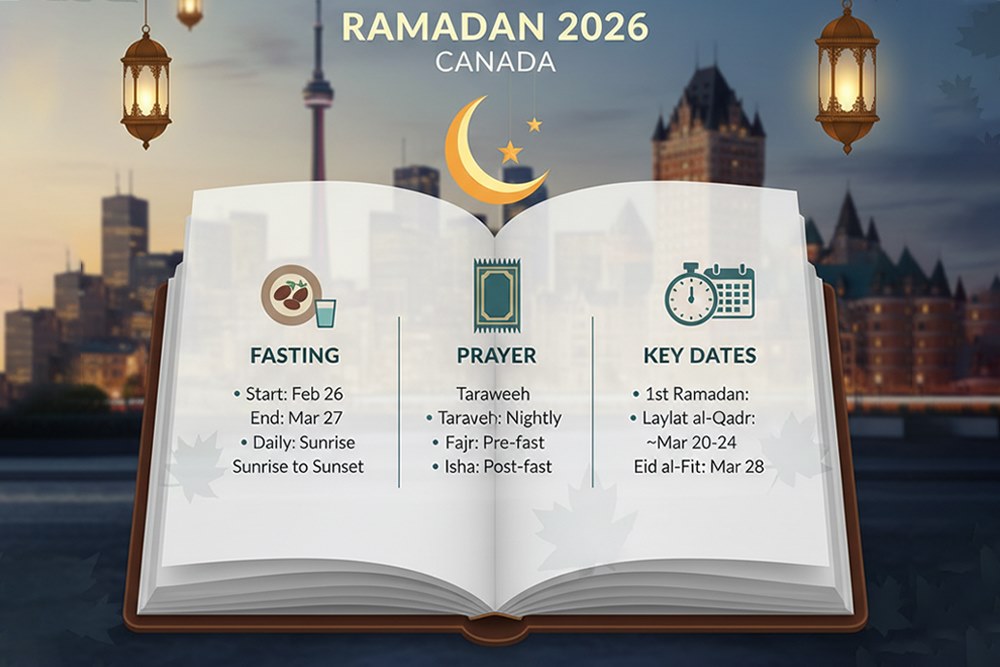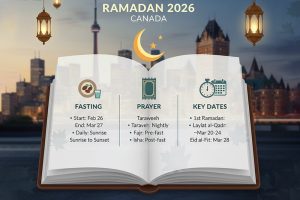Ramadan is a sacred month of fasting, worship, reflection, and community for Muslims around the world. For Muslims in Canada, observing Ramadan means aligning with both spiritual rhythms and the realities of northern latitudes. In this post, we’ll look at the Ramadan 2026 Canada calendar, expected suhoor and iftar times, prayer timings in Ramadan, the influence of the Islamic calendar in Canada, and important dates to watch.
1. When Does Ramadan 2026 Begin (in Canada)?
Ramadan follows the lunar (Hijri) calendar, and thus its start shifts about 10–12 days earlier in the Gregorian calendar each year. The precise starting day is confirmed through moon sighting, but current astronomical estimates and global calendars suggest:
- Ramadan 2026 is expected to begin the evening of Tuesday, February 17, 2026, and run through to the evening of Wednesday, March 18, 2026.
- Some sources list the start as February 18 (evening), depending on local sighting differences.
- In Canada, local moon-sighting or religious councils (masjids, Islamic organizations) will confirm the official first day.
Thus, for planning purposes across Ramadan 2026 Canada, you can tentatively mark February 17–18 (evening) as the start, with fasting beginning the next dawn, and the month ending around March 18 (depending on sighting).
2. The Role of the Islamic Calendar in Canada
The Islamic calendar r Canada is essentially the same as the global Hijri lunar system — 12 months of 29 or 30 days, depending on moon sighting. What differs locally is when those months begin and end in a given region, based on visibility of the crescent moon.
Mosques and Islamic organizations in different Canadian cities (Toronto, Montreal, Vancouver, etc.) will typically follow local committees or international agreements (e.g., based on Makkah, or global consensus) to confirm Ramadan’s start. That means while national projections are useful, always check with your local mosque or Islamic council for final confirmation.
Because of how the Islamic calendar works, fasting days, and possibly suhoor and iftar times, will shift gradually each year, making Ramadan earlier by about 10–12 days on the Gregorian calendar.
3. Understanding Suhoor & Iftar in Canadian Contexts
During Ramadan, Muslims fast from suhoor (pre-dawn meal) until iftar (sunset breaking). In Canada, due to varying latitudes, daylight hours in winter months are shorter, which influences suhoor and iftar windows.
- Suhoor and iftar times will vary by city (Toronto, Montreal, Vancouver, etc.).
- For example, in Toronto during Ramadan 2026, the Fajr/start of fast (suhoor ends) is expected around 5:52 AM EST on day 1, and Maghrib/iftar (sunset) about 5:52 PM EST (i.e., fast breaking immediately at sunset)
- In Montreal, day-one timings are expected to be ~ 5:29 AM (Fajr) and 5:26 PM (Maghrib) on February 18, 2026.
- Over the month, these times will shift slightly each day (sunrise, sunset, and dusk change).
Because of the wide geography of Canada, suhoor and iftar times in western provinces (e.g., British Columbia, Alberta) will differ from those in eastern provinces. Always consult your local mosque’s published timetable.
4. Prayer Timings During Ramadan
While daily prayers (Fajr, Dhuhr, Asr, Maghrib, Isha) remain the same in Ramadan, many Muslims also observe the additional night prayer Taraweeh. Thus, prayer timings during Ramadan become even more central to daily life.
- In Toronto during Ramadan 2026, the calendar shows the first days:
• Fajr ~ 5:52 AM (EST)
• Dhuhr ~ 12:31 PM
• Asr ~ 3:23 PM
• Maghrib ~ 5:52 PM (sunset)
• Isha ~ 7:11 PM - These prayer timings for Ramadan will gradually shift each day (a few minutes) as sunrise and sunset change.
- In other cities across Canada, timetables are published by Islamic Relief Canada, local mosque websites, and services like Islamic Finder.
During Ramadan, it’s common to read or recite more Quran during non-fasting hours, attend nightly Taraweeh prayers, and observe I’tikaf (retreat) in the last ten days. The prayer timings in Ramadan serve as daily anchors, dividing the day into worship, fasting, reflection, and rest.
5. Major Dates & Highlights in Ramadan 2026
Here are some key dates and observances for Ramadan 2026 in Canada:
- Ramadan begins (evening): Feb 17 (or 18, depending on sighting)
- First day of fasting: Feb 18, 2026 (for most of Canada)
- Laylat al-Qadr (Night of Power): Expected often on the 27th night (March 16, 2026) — a night of special worship, recitation, and dua.
- Eid al-Fitr (breaking fast): Evening of March 18, 2026 (or March 19, depending on sighting)
Muslims in Canada typically hold large communal iftars, masjid lectures, charity drives (zakat, sadaqah), and community worship throughout these dates.
6. Tips for Canadian Fasters in 2026
Because Canada spans a wide range of latitudes and climates, observing Ramadan has its own challenges. Here are some tips:
- Plan meals wisely — Use the suhoor iftar times and adjust your nutrition and hydration accordingly.
- Check local timetables — Always rely on your mosque’s printed or digital schedule (they often publish province-specific Islamic calendar Canada versions).
- Rest and pace yourself — During long fasting days, rest when possible, especially before/during Dhuhr and Asr.
- Night worship — Use Iftar to refresh, then join Taraweeh prayers in masjids during the evening.
- Charity & community — Ramadan in Canada is a chance for unity: donate to local food banks, help disadvantaged Muslims, and support Islamically minded causes.
- Health consultation — If you have any medical conditions, consult a doctor before deciding to fast, especially in far-north regions with longer daylight.
7. Sample Day: Ramadan Timetable for Toronto (Day 1)
To illustrate, here’s how a day might look in Toronto on the first day:
- Fajr / suhoor ends: ~ 5:52 AM (EST)
- Sunrise: ~ 7:12 AM
- Dhuhr: ~ 12:31 PM
- Asr: ~ 3:23 PM
- Maghrib / iftar (sunset): ~ 5:52 PM
- Isha: ~ 7:11 PM
Thus, the fasting period is roughly from ~ 5:52 AM to ~ 5:52 PM — about 12 hours in Toronto on day one. Over the month, those windows shift slightly earlier or later.
Each city (Montreal, Vancouver, Calgary, etc.) will have its own suhoor iftar times and prayer timings during Ramadan — always refer to your local mosque or trusted Islamic timetable service.
8. Why Knowing the Calendar Matters
Understanding the Ramadan 2026 Canada calendar isn’t just about knowing when to eat or pray. It helps:
- Plan your work, school, and social schedule around fasting windows
- Prepare spiritually by knowing when Laylat al-Qadr or the last ten days fall
- Budget meals, groceries, and community events
- Coordinate with family, friends, and the masjid
Because of the shifting nature of lunar months, aligning with the Islamic calendar in Canada ensures you stay in sync with the broader Muslim community.
FAQ’s
Q1. When does Ramadan 2025 start in Canada?
A: Ramadan 2025 is expected to begin the evening of Friday, February 28, 2025, with the first fast on March 1, depending on local moon sighting.
Q2. What are the fasting times for my city?
A: Fasting times depend on your city’s suhoor (Fajr) and iftar (Maghrib) schedule. Check your mosque’s Ramadan timetable or trusted Islamic apps for suhoor and iftar times in your area.



